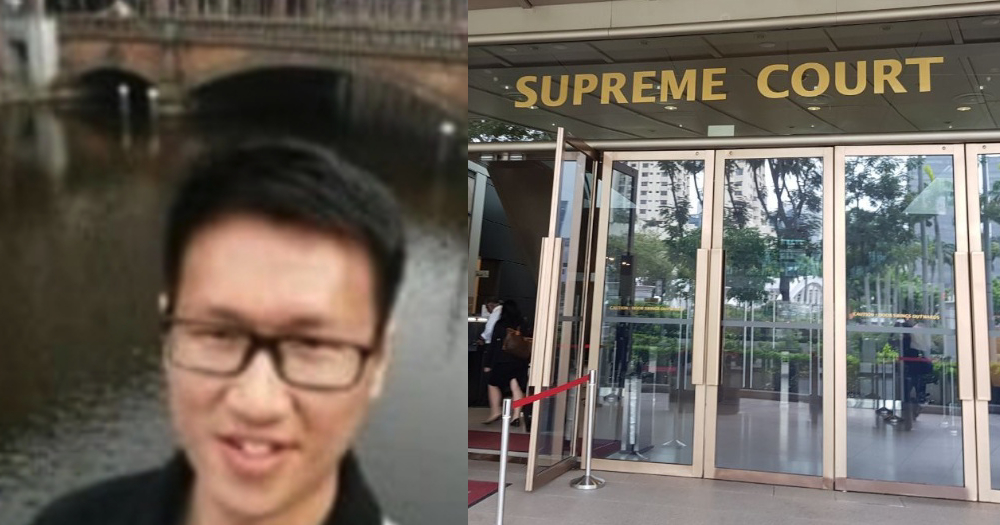Rather than showing that he had an extremely strong propensity to reform, a convicted molester's good grades was instead a sign of his ability to "compartmentalise his life" while addicted to pornography, argued Deputy Public Prosecutor Kristy Tan.
Tan was presenting the prosecution's case at the Mar. 10 appeal against a probation sentence meted out to National University of Singapore (NUS) undergraduate Terence Siow Kai Yuan.
Chief Justice Sundaresh Menon, who was presiding over the appeal, said that it was "not clear" if the district judge handing out the sentence had "completely considered" how Siow could compartmentalise his otherwise respectful life from his sexual problems.
The Chief Justice will give his judgment at a later date.
Siow has not started his probation as the sentenced was stayed due to the appeal.
Background to the appeal
In September 2019, Siow, 23, had been convicted of outraging the modesty of a woman after he molested her at Serangoon MRT Station in September 2018.
District Judge Jasvender Kaur had initially described Siow's offences as "minor intrusions" and sentenced him to 21 months of supervised probation and 150 hours of community service.
Kaur had also referenced a probation report that assessed the offender to be suitable for probation as his academic results showed he had the "potential to excel in life" and "strong potential for reform".
Siow's case received a lot of attention from members of the public who viewed the sentence to be too light.
An online petition was set up to show displeasure and Minister of Law and Home Affairs K Shanmugam expressed his surprise at the verdict.
Living a double life
The prosecution told the court on Mar. 10 that it was seeking at least three weeks' jail for Siow.
In their submissions, prosecutors argued that Siow had "neither demonstrated an extremely strong propensity for reform, nor shown that his case is so exceptional as to warrant an order of probation".
Addressing the line of reasoning that Siow's good academic performance and conduct during National Service showed his propensity to reform, the prosecutors pointed out that it was merely evidence of Siow's ability to compartmentalise and live a double life.
Deputy Public Prosecutor Tan argued that Siow's consistent record of consistently performing well through his years in junior college and university had not "stopped him from pursuing a parallel track of behaviour that would be good for him to change".
A good dose of deterrence might be the change-maker in this particular case, she added.
Showed remorse from "very early on"
Siow's lawyer Raphael Louis argued that his client had shown remorse and an effort to change from "very early on".
This included going for counselling sessions at NUS and trying to kick his pornography habit — which the court heard started in 2008.
Louis also pointed to Siow's and his parents' expressed willingness to change.
"They expressed willingness to supervise Terence and make sure that he abided by his probation," he said.
While they were initially hesitant to monitor his mobile phone and computer usage, they were "willing to do so if instructed by the probation officer".
However, the Chief Justice said that this was not necessarily exceptional as most parents would want to avoid a custodial sentence for their son.
Prosecutors also attempted to cast doubt on Siow's remorsefulness by pointing out that Siow had not taken the initiative to start an offence-specific treatment programme that would have been mandated by his probation.
Tan said that Siow had the resources available to start the programme on his own, despite the fact that his probation had not started.
"Not clear"
While he acknowledged that the "offence did not rise to such a gravity that probation should be ruled out," Menon said that a probation sentence was still "exceptional".
Menon indicated that Siow's case would turn on whether he had shown an "extremely strong propensity to reform" — something he was "not clear" about.
"He had these sexual problems and at the same time, he had an outside persona," said the Chief Justice, who also called the "dichotomy" between Siow's outward appearance and private life "worrying".
The Chief Justice also said that Kaur had seemed to place emphasis on Siow's outward persona but "overlooked" the sexual problems he was dealing with.
"How would the manifestation of a good outward persona demonstrate his propensity for reform?" he said.
Top photos via Terence Siow/Facebook and Matthias Ang
If you like what you read, follow us on Facebook, Instagram, Twitter and Telegram to get the latest updates.
